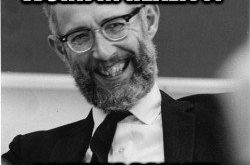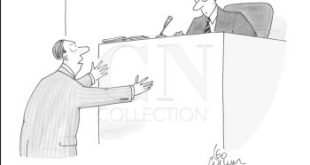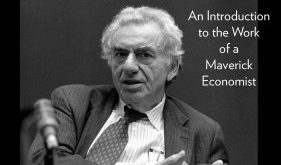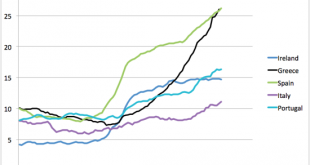A democratic polity is supposed to be based on egalitarian distribution of political power. In a system where virtually all resources are available for a price, economic power can be translated into political power by channels too obvious for mention. In a capitalist society, economic power is very unequally distributed, and hence democratic government is inevitably something of a sham. In a sense, the maintained ideal of democracy makes matters worse, for it adds the tensions...
Read More »Where modern economics went wrong
Where modern economics went wrong [embedded content] Many economists have over time tried to diagnose what’s the problem behind the ‘intellectual poverty’ that characterizes modern mainstream economics. Rationality postulates, rational expectations, market fundamentalism, general equilibrium, atomism, over-mathematisation are some of the things one have been pointing at. But although these assumptions/axioms/practices are deeply problematic, they are mainly...
Read More »Rational expectations — sheer nonsense
Rational expectations — sheer nonsense Expectations, since they are informed predictions of future events, are essentially the same as the predictions of the relevant economic theory. At the risk of confusing this purely descriptive hypothesis with a pronouncement as to what firms ought to do, we call such expectations “rational.” It is sometimes argued that the assumption of rationality in economics leads to theories inconsistent with, or inadequate to...
Read More »Economics — confusing mathematical masturbation with intercourse between research and reality
Economics — confusing mathematical masturbation with intercourse between research and reality There’s no question that mainstream academic macroeconomics failed pretty spectacularly in 2008 … Many among the heterodox would have us believe that their paradigm worked perfectly well in 2008 and after … This is dramatically overselling the product. First, heterodox models didn’t “predict” the crisis in the sense of an actual quantitative forecast. This is...
Read More »Hur står det till med ekonomerna?
Hur står det till med ekonomerna? Seminarium: Hur står det till med ekonomerna?De bommade finanskrisen. De skrev ut recept som förvärrade Greklandskrisen. De utgår från en människa som inte finns, och matematiska modeller som har väldigt lite med verkligheten att göra. Och de får bra betalt för jobbet. I nya numret av tidskriften Fronesis skärskådas den dominerande nationalekonomin, en vetenskap som har enorma anspråk, men som ständigt kommer till korta....
Read More »Dynamic programming — an introductory introduction
Dynamic programming — an introductory introduction [embedded content] Advertisements
Read More »More NAIRU bashing
As yours truly argued in a post the other day, NAIRU does not hold water simply because it hasn’t existed for the last 50 years. But still today ‘New Keynesian’ (a monstrous misnomer) macroeconomists use it — and its cousin the Phillips curve — as a fundamental building block in their models. Why? Because without it ‘New Keynesians’ have to give up their (again and again empirically falsified) neoclassical view of the long-run neutrality of money and the simplistic idea of...
Read More »Minsky matters!
In his book Why Minsky Matters L. Randall Wray tries to explain in what way Hyman Minsky’s thoughts offer a radical challenge to mainstream economic theory. Although there were a handful of economists who had warned as early as 2000 about the possibility of a crisis, Minsky’s warnings actually began a half century earlier—with publications in 1957 that set out his vision of financial instability. Over the next forty years, he refined and continually updated the theory. It is...
Read More »Robert Lucas — an example of macroeconomic quackery
Robert Lucas — an example of macroeconomic quackery In an interview a couple of years ago, Robert Lucas said he now believes that “the evidence on postwar recessions … overwhelmingly supports the dominant importance of real shocks.” So, according to Lucas, changes in tastes and technologies should be able to explain, e.g., the main fluctuations in unemployment that we have seen during the last seven decades. Let’s look at the facts and see if there is any...
Read More »Behavioural finance
To-day, in many parts of the world, it is the serious embarrassment of the banks which is the cause of our gravest concern … [The banks] stand between the real borrower and the real lender. They have given their guarantee to the real lender; and this guarantee is only good if the money value of the asset belonging to the real borrower is worth the money which has been advanced on it. It is for this reason that a decline in money values so severe as that which we are now...
Read More » Heterodox
Heterodox









